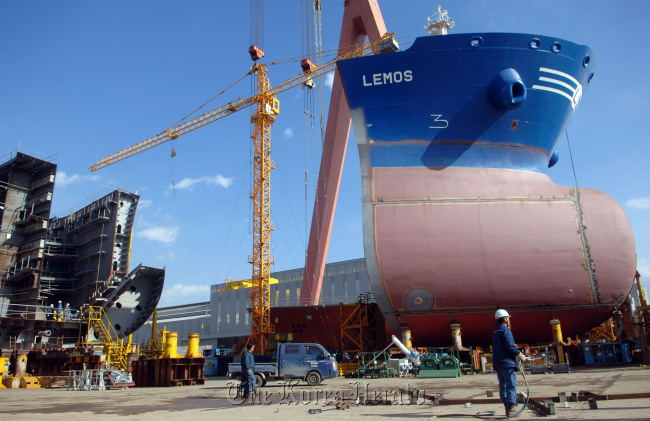Despite the continued slump in shipbuilding orders overseas affected by the prolonged global economic downturn, the nation’s top three shipbuilders have set bold goals for winning orders in the beginning of the year, renewing their growth strategy, industry sources said.
Hyundai Heavy Industries, the world’s largest shipbuilder, said it increased its order target steeply by 52.3 percent to $29.7 billion this year compared with order results in 2012.
 |
A tanker is under construction at the Hyundai Heavy Industries shipyard in Ulsan. (Bloomberg) |
The other two shipbuilders also unveiled double-digit order goals this year. Daewoo Shipbuilding & Marine Engineering, or DSME, pushed up its order target by 18 percent to $13 billion from orders registered in 2012.
Samsung Heavy Industries also set its order goal at $13 billion, a 35 percent rise from orders won in 2012.
Among the top three shipbuilders, Hyundai Heavy presented the most aggressive order goal this year in a bid to recover from a poorer performance than competitors in its shipbuilding and offshore business. The company achieved only 63 percent of the 2012 annual order target of $30.6 billion by winning $19.5 billion in orders.
Hyundai Heavy has diversified its business portfolio beyond the shipbuilding sector to secure stable income sources regardless of the global economic cycle, but it cannot overlook its shipbuilding business, which still makes up about 30 percent of its total sales.
“The corporate slogan of this year is ‘turning crisis into opportunity.’ To escape from crisis in the shipbuilding sector, we are shifting more toward the offshore business from the slumping shipbuilding business,” a company official said.
It is a common strategy to strengthen the high-value-added offshore business among the top three shipbuilders. In the race, Hyundai Heavy is slower than its rivals as the company with the largest shipbuilding capacity had to drive up shipbuilding order activities to keep docks running. Sales from Hyundai Heavy’s offshore business fell to below 10 percent of total sales last year, whereas sales from the offshore business at DSME and Hyundai Heavy earned more than 50 percent of total sales in 2012.
“The company’s winning strategy in the downturn is to sharpen its technological edge in high-end ships like green ships in the shipbuilding sector and future promising subsea plants in the offshore business,” the official added. Hyundai Heavy, in particular, jointly runs an R&D project in subsea plant technology with the Ministry of Knowledge Economy.
DSME and Samsung Heavy are no different than Hyundai Heavy in seeking to become the top globally in the offshore sector for future growth, but they showed a difference in target segment.
DSME has a competitive edge in such offshore facilities as LNG floating, production, storage and offloading, while Samsung Heavy is a global leader in drill ship construction.
On the other hand, market watchers issued mixed outlooks for each shipbuilder’s growth target. Korea Investment & Securities issued a positive outlook for shares of DSME, saying the company will continue its growth momentum in its offshore business this year following 2011 and 2012.
Tongyang Securities remained skeptical over the performance of Hyundai Heavy, doubting a recovery in shipbuilding due in part to uncertainties in Europe, the biggest market for shipbuilders.
By Seo Jee-yeon (
jyseo@heraldcorp.com)







![[Today’s K-pop] Blackpink’s Jennie, Lisa invited to Coachella as solo acts](http://res.heraldm.com/phpwas/restmb_idxmake.php?idx=644&simg=/content/image/2024/11/21/20241121050099_0.jpg)
